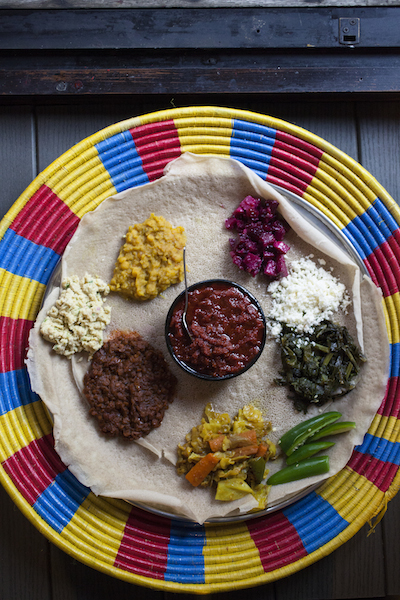It’s not uncommon for chefs to spend weeks touring Rome before opening a new restaurant, or tasting every ramen stall in Tokyo. For Hibist Legesse, who owns the six-year-old Ethiopian restaurant Bati in Fort Greene, menu research was more personal: She went to Addis Ababa to cook with her aunts, Seble Solomon and Harege-weyn Belai.
“Everything I learned,” says Legesse, who has lived in the United States since high school, “I learned from going back and forth and cooking with these ladies.”
Solomon is Legesse’s great aunt, and the one who taught her how to master kitfo, Ethiopia’s silky, aromatic version of steak tartare.
Kitfo is minced raw beef seasoned with a little bright-red mitmita, or dried hot chilies ground with spices like Ethiopian black cardamom, cloves and salt, that is then gently massaged with warm niter kibbeh, a spiced clarified butter that is the flavorful foundation of many Ethiopian meat dishes.
Solomon hails from the semi-mountainous area of southwest Ethiopia known as Gurage, and her niter kibbeh — recipes vary, but they’re often seasoned with a blend of nigella, more black cardamom and a pungent, floral dried herb called koseret — was noticeably different from the city version Legesse grew up with.
Solomon’s approach is to let the koseret rather than the cardamom star, says Legesse, which gives her kitfo an intoxicating scent and an almost tropical flavor.
“It’s the most wonderful perfumey thing,” says Legesse of the herb, which smells like a blend of roses, lemon verbena and mint, with a hint of white pepper. She hopes to someday grow it here, but until then, she begs friends and family to bring it to her when they travel, even though she has a huge stash accumulating in Brooklyn.
Without koseret, she adds, “I wouldn’t be able to make anything else.”
That includes Ethiopia’s most famous dish, the brick-red chicken stew called doro wett, which is the specialty of Aunt Harege-weyn Belai.
Wett, also spelled we’t, wat or wet, is the Amharic word for a long-simmering stew, according to Legesse: Doro wett is chicken slow-cooked with spices, niter kibbeh and several pounds of red onions. Once the chicken has simmered for hours over a very low fire — “that’s what makes a really good wett,” says Legesse — you serve it topped with hard-boiled eggs.
If time and niter kibbeh are essential to doro wett, so is the berbere, Ethiopia’s all-purpose spice mix. “Every woman has her own berbere,” says Legesse, and like doro wett itself, “everybody tells you that theirs is the best.”
In Ethiopia, says Legesse, berbere begins with a visit to Addis Ababa’s huge food market, which she attended with her aunt. You pick out your chilies — Legesse calls them serranos — and remove the seeds, then have them ground with ginger, garlic, red onion and rue seed. That is dried in the hot Ethiopian sun, then ground again with Ethiopian black cardamom, bishop’s weed, nigella, salt, cloves, nutmeg and cumin.
“It’s very serious business,” says Legesse, adding that a family might do this once or twice a year, putting up a hundred or so pounds of berbere.
Legesse now gets hers — made in just this manner — from Ethiopia, via a friend who began importing food products shortly after she opened Bati. “He became my vendor,” she recalls, “and then my life changed.”
She’s hardly kidding. “Really, the measure of a woman,” says Legesse of traditional Ethiopian culture, “is if you know how to make a good doro wett.”
That’s why she went back three times to watch her aunt make it. “To the point,” says Legesse, “where she’s like, ‘oh my God, you’re back again?’”
Go meat-free! Get the scoop on Bati’s traditional vegan dishes here.
Photo credit: Janelle Jones



